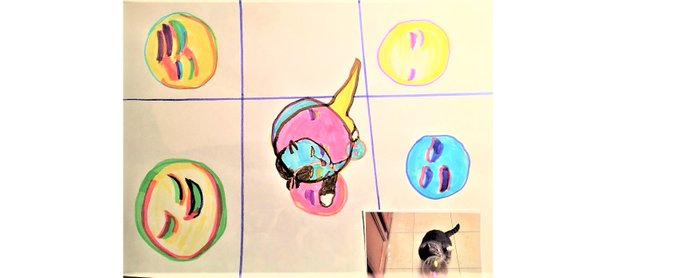Here is a genuine ghost story for the Halloween season. Our Michigan local history of the Dixboro Ghost is told quite well by Carol Willits Freeman in her book Of Dixboro, Lest We Forget, and by Russel Bidlock, in a 1962 paper, “The Dixboro Ghost,” presented to the Washtenaw County Historical Society. This Michigan Pioneer ghost story, too, is especially astonishing in a number of ways that invite our musing and commentary in the harvest season.
Among the reasons that this appearance or apparition is astonishing is that the man who experienced it testified in the Washtenaw County Court before the Justice of the Peace, in December of 1845, to nine separate apparitions between September 27 and November 6th of that year. In this, the ghost of Martha Crawford-Mulholland apparently revealed three murders- her own, that of her sister, and possibly of a tin peddler who disappeared when passing through Dixboro, his horse and cart left undisturbed. The ghost may also have prevented a fourth murder, that of her son Joseph, who would likely be in danger from her apparent murderer, James Mulholland. The Ghost herself seems changed- pacified- through the appearances. As she- the ghost of Martha- says in her final word,
I wanted to tell a secret, and I thought I had.
Isaac Van Woert, the one who saw the ghost, was travelling to Ann Arbor when his wagon broke down, and he was forced to turn back to Dixboro. Isaac had come from Livingston New York seeking a life Michigan with his wife and two children. Even then, Ann Arbor was a flourishing town, while Dixboro seemed to develop less, and became a suburb, as if stuck in time. John Dix had founded the town, but was unpopular. Dix had left in 1833 for Texas, just three years after the brothers James and John Mulholland arrived in 1830. Dix and Mulholland together were assessed a 50$ “indictment” by the United States. And the Mulhollands live on the corner of the general store. James had a wife Ann, who had become ill and disturbed when her sister, a young widow from Canada, came to visit with her young son Joseph, then about 5 years old. Unknown to Isaac and his family, Ann, James and most recently Mary had just died in Dixboro, the pall of the funeral week barely passed. Van Woert saw that Mr. Hawkins had a building under construction, and applied for the work. Needing lodging, he was directed to Joseph Crawford, now about 15, whose mother Martha had just died, and whose house was then available. From where it is that Joseph is summoned, and why he is not himself living in his mothers house is important to our story, but it is noted that Joseph later married Jane, the daughter of a Mr. Whitney, who had recently bought property on the north side of Main street or Plymouth road. Joseph later bought and owned this property until 1864. As He is found by Isaac moving a load of stone, and may have been working in lots 7 and 8 on the Whitney house he would later own with his wife.
The first time the ghost appeared, she did not speak. Three days after arriving, Isaac was before the front window, his wife gone to visit a neighbor, Mrs. Hammond, two “rods distant,” and his sons playing in the back yard, about sunset. Combing his hair in the window, where one might see a reflection, there appeared…
…a woman with a candlestick in her hand in which was a candle burning. She held it in her left hand. She was a middling sized woman, wore a loose gown, had a white cloth around her head, her right hand clasped in her clothes near the waist. She was a little bent forward, her eyes large and much sunken, very pale indeed; her lips projected, and her teeth showed some.
She moved slowly across the floor until she entered the bedroom and the door closed. I then went up and opened the bedroom door, and all was dark. I stepped forward and lighted a candle with a match, looked forward but saw no one, nor heard any noise, except just before I opened the bedroom door, I thought I heard one of the bureau doors open and shut.
The courage and open mind of Isaac are noteworthy, as well as his rational and responsible proceedings, given human ignorance regarding such matters. It is interesting too that the ghost chose- or Isaac was able- to see and hear her, rather than for example Joseph, who would have been disturbed and not believed. The purpose does seem to be to make the matter public. A few days later, Isaac spoke of what he had seen, and learned then, for the first time that a widow Mulholland had lived there and had recently died. It is likely he spoke to Mrs Hammond, the neighbor, though it may have been to Jackson Hawkins. It does not seem he spoke directly to his landlord, the 15 year old Joseph.
The second time Isaac sees her, still early in October, she speaks. she says,
‘Don’t touch me- touch me not.’
Isaac steps back and asks her what she wants She says to him:
‘He has got it. He robbed me little by little, until they kilt me! They kilt me! Now he has got it all!’
Isaac asks her then, “Who has it all” She answers:
‘James, James, yes, James has got it at last, but it won’t do him long. Joseph! Oh, Joseph! I wish Joseph would come away.’
James had petitioned the court to become executor of the estate of Mary by having her declared incompetent. But as Joseph, and not James, is the landlord, this does not seem to have worked- yet. It is possible too that she refers to something else that James does have, such as money or gold, from the joint enterprise with John. It is not said how John dies, but throughout the story, there is no suspicion that he was murdered by James. It is possible that the event of the ghost prevents the plots of James from occurring. Throughout the appearances, it is as though the ghost were trying to protect her son Joseph, and figuring out gradually how this might be done. In the third appearance, she appears in the night in his room, and he does not know what hour it is, so it is as if he were awakened. Here she says:
James can’t hurt me any more. No! he can’t I am out of his reach. Why don’t they get Joseph away? Oh, my boy! Why not come away?”
It is almost as if she is calling Joseph to come where she is, out of the reach of James. And who is it she thinks of when she she asks, why “they” do not get Joseph away?
The fourth appearance is an apparition that is of a scene past, rather than of the ghost herself, and includes a person then currently living. The testimony of Isaac is as follows:
The fourth time I saw her about 11 O’clock P.M. I was sitting with my feet on the stove hearth. My family had retired, and I was heating a lunch, when all at once the front door stood open, and I saw the same woman in the door supported in the arms of a man whom I knew. She was stretched back and looked as if she was in the agonies of death. She said nothing, but the man said, “She is dying. She will die.” And all disappeared, and the door closed without a noise.
As Carol Freeman relates, “The night before she died, she went to a neighbor’s house where she “fell into a fit of delirium” and was carried home by her brother-in-law. He was heard to say, “She is dying. She will die” (Freeman, p. 23). This neighbor is likely Mrs. Hammond, 2 rods distant. If Isaac has heard this from the ghost for the first time, the confirmation is astonishing.
The fifth appearance is the first in daylight, at least since the ghost appeared in the window, still in October, “about sunrise.” Isaac testifies, “I came out of my house to go to my work, and I saw the same woman in the front yard. She said:
I wanted Joseph to keep my papers, but they are ____.
Van Woert explains, “Here, something seemed to stop her utterance. Then she said,
‘Joseph! Joseph! I fear something will befall my boy.’
Van Woert concludes, “And all was gone.” The papers may relate to the interest of the ghost in the bureau drawer, though another possibility for this will soon appear. James may well have stolen the papers from the division of his property with his brother John, which the ghost would intend to be passed on to her son Joseph.
In Shakespeare’s Hamlet, Horatio also sees the ghost, confirming it is not one mind’s delusion. Horatio, a scholar, explains that the ghosts of damned spirits return at sunrise from wandering because they fear “Lest daylight should look their shames upon.” According to Puck and Oberon in A Midsummer Night’s Dream, these willfully exile themselves from light, in contrast with the Fairy sort of spirits, who “oft make sport” with the morning’s love.” Some Protestants believed that all ghosts were bad, while others did not believe in them at all, rejecting these with Purgatory. It is not clear what role the Dixboro Methodist church plays in the story. A R. Stoddard is a Methodist minister in Ann Arbor in 1839. But there is not yet a Church and preacher in Dixboro.
In Hamlet, a ghost too reveals a crime, and there is similarly the difficulty of the protagonist to bring the murderer to Justice when the crime is hidden.
The sixth appearance is again at night, at midnight, still in October. Again the room became light though no candle was visible, and Isaac sees the same woman standing in the bedroom. Isaac looks at his wife, afraid she will awaken, but the ghost tells him,
‘She will not awake.’
Van Woert testifies: “The ghost seemed to be in great pain; she leaned over and grasped her bowels in one hand and in the other held a phial containing a liquid. I asked her what it was. She replied,
‘Doctor said it was balm of Gilead.’
Then she disappeared. She does not say that it is this balm, but that the doctor said it was such. A balm, though, is not an oil in a vial, but an ointment. “Balm of Gilead” is made in the US from cottonwood trees (and so is similar to turpentine). In the Eastern Hemisphere, it is the original anointing oil, grown in the suburb of Jericho that would be Gilead, and this is a fragrant healing ointment. It is also the name for universal tonics or remedies as were popular at the time and sold by paddlers.
The last three appearances concern the ghost’s own purgatory. While working at a bench as he did in the evenings, the same woman appeared, saying to him,
I wanted to tell James something, but I could not. I could not.
Isaac asks her what she wanted to tell James. She answers,
‘Oh, he did an awful thing to me.
Isaac asks her who, and she answers,
‘Oh! he gave me a great deal of trouble in my mind.’ ‘Oh, they kilt me, they kilt me!’
which she repeated several times. Isaac then walks toward her, but she kept the same distance from him, as does a rainbow or mirage. Isaac asks her if she had taken anything that killed her. She answered,
‘Oh, I don’t____. I don’t _____.’
Isaac relates, “The froth in her mouth seemed to stop her utterance,” showing him what she could not tell. Then saying again, “They kilt me,” Isaac asks, “Who killed you,” and she answers: “I will show you.” Isaac then relates:
Then she went out of the back door near the fence, and I followed her. There I saw two men whom I knew, standing. They looked cast down and dejected. I saw them begin at the feet and melt down like lead melting, until they were entirely melted; then a blue blaze two inches thick burned over the surface of the melted mass. Then all began bubbling up like lime slacking. I turned to see where the woman was, but she was gone. I looked back again, and all was gone and dark.
As copper has a green flame, we might consider whether lead or other metal has such as lead or arsenic happens to have a blue flame. The image of damnation, for murder, is similar to the melting of the Wicked Witch of the West in the movie the Wizard of Oz. The two men known to Isaac are James but not John, nor Joseph, but possibly the peddler selling the balm of Gilead. The only other man in Dixboro we know he knows is Hawkins, on whose building Isaac is employed, though it would seem strange if he already had met the peddler.
In the eighth appearance, Isaac relates:
The next time I saw the woman was in the back yard, about Eight O’ clock. P. M. She said, “I want you to tell James to repent. Oh! if he would repent. But he won’t. He can’t. John was a bad man,” and muttered something I could not understand. She then said, “Do you know where Frain’s Lake is? She then asked another question of much importance, and said “Don’t tell of that.”
Van Woert later said that what he was told not to tell pertained to the well at the corner of Mill and Main, near Martha’s house. The well has since been filled in. Frain’s Lake is up the road to the East about a mile or so.
I asked her if I should inform the public on the two men that she said had killed her. She replied, ‘There will be a time, The time is coming. The time will come. But Oh! Their end! Their end! Their wicked end. She muttered something about Joseph, and all was dark.
When Martha Mulholland had come to visit her sister Ann in 1835, she begun the courtship with John, and planned to marry him, when Ann, disturbed, told her a terrible secret about John and James that has never been revealed. Martha then attempted to break off the engagement and return to Canada, but according to the story James then threatened that she would never reach Canada alive. Still, it is difficult to explain why she would then remain and marry John, except that she was pregnant. A child Martha had with John had died shortly after his father. One does note that every person standing between James and the property of his brother has died untimely. One wonders about the earthly end of John Mulholland. Martha had been taken to see a doctor Denton at the University of Michigan in 1845, just before she died. She offered to tell the doctor the secret if he would then bleed her to death, as she did not want to live after revealing it. The doctor, though, refused of course, but never did reveal the secret, likely as according to the Hippocratic Oath.
In the ninth appearance, she is dressed in white, and her hands hang down at her side, as though her doing were done. She “stood very straight,” and “looked very pale.” She said, “I don’t want anybody here, I don’t want anybody here. She then muttered words he could not understand, except occasionally the word “Joseph.” She then said to Isaac, “I wanted to tell a secret, and I thought I had.”
And all was gone and dark.
The secret may be that James and John killed the peddler, and then killed every person who knew about this: John who told Ann, Ann who told Martha, Martha who told… But does murder fit the secret which Martha would not want to continue living having disclosed? It is possible that because she told the doctor, and Isaac testified before the Justice of the Peace, the body of Martha was exhumed in January, as the public demanded when the testimony of Isaac became known. It was determined then, famously, that Martha was indeed poisoned, and by a person other than herself, though what the poison was is not said. Notes from this coroner’s inquest would be very interesting with the hindsight of 173 years of the progress of science.
The well might have been checked for a bottle from poison. The lake, too could now be searched better, and the bodies of both Martha and Ann exhumed, along with that of John. Many records no doubt exist, such as from the lawsuits for slander- none of which were brought against Isaac Van Woert, who speaks quite carefully in his testimony. Isaac continued living in Dixboro for about two years.
That the Mulholland property was sold at a Sheriff’s sale means that it was not sold when James left Dixboro. He may have disappeared, or even suffered a fate similar to those he made suffer. The alternative explanation for the appearance of the ghost is that it was part of a conspiracy to banish Mulholland “because of his mistreatment of both his wife and his sister in law.” But on the 1874 map of Superior Township, a W. and an S. Mulholland own property just east of Dixboro, so it may be that his wife and some children remained.
Ellen Hoffman, in an article, “The Dixboro Ghost” in 3 parts [See Appended section], adds some details regarding James and John. The property division was made by John when he was near death and in failing health, and all was not in place when John died. John was two years older than James, though the arrived in Dixboro two years later. James had brought Ann from Canada, though her maiden name, the same as that of Martha- is yet unknown. The Mulhollands came from County Monaham in Ireland, and later sold 40 acres to Samuel their father. Samuel petitions the court in 1846 to appoint his sons Sam and William executors, but he does not ask that James be so appointed. And these would be those names owning property east of Dixboro on the map of 1874. Hoffman finds the second wife of James as well….
A site called “What Lies Beyond” adds:
However, James didn’t leave the area immediately. In 1838, he had married Emily Loomis and when she died in 1847, the two had four young children, one of whom was only 4-weeks-old. Although there was no evidence to charge him with murder, or any other crime, townsfolk condemned James, then 34, for his greed and blamed him for Martha death. Because he was no longer welcome, he gathered up his family and belongings and departed Dixboro for parts unknown, never to be seen nor heard of again. In 1852, some of his former land holdings were sold at public auction.
In the end, Martha’s son, Joseph Crawford, inherited John Mulholland’s estate and by 1850, he was the only one of the principals with a connection to the Dixboro ghost still living in Superior Township. He was a successful businessman, married in 1855 and later settled in Livingston County.
[Note 1]
Another reason that the Dixboro apparition is astonishing is the spirit-ology assumed by the ghost and the literary imagery. It is accurate, and includes things of which a carpenter and family man is not likely to think, while excluding anything false that would indicate it was the work of human contrivance. The wish of the ghost that James could repent means that the ghost has been freed from revenge or the inability to forgive, as though making it through purgatory. That James, or such a murderer, cannot repent, as though they had extinguished the light of their own conscience, here too has another example. In these cases, it is as though the soul itself of the community wished to purge the disturbance, as of terrible crime. In murders, bodies are said to rise toward the surface, symbolically true. Socrates too notes that crime of public significance is sometimes revealed by a kind of divine madness (Phaedrus 244d-e). Yet it is difficult to imagine one more sane in his proceeding, having seen and spoken to a ghost, than Isaac Van Woert.
Note 1: Author: Graveyardbride.
Sources: John Robinson, WFMK, April 29, 2017; Ellen Hoffman, GLakes-Tales Blog; Dixboro.com; Washtenaw Impressions, Washtenaw Historical Society; and William B. Treml, Ann Arbor News, October 31, 1972.
II The Dixboro Ghost: Psychological Commentary
What Socrates says to Phaedrus is that love should not be rejected and favors given rather to the non-lover on the grounds that love is a madness, because there are some forms of madness that are a gift from the gods, and love is one, like prophecy, tragedy and lyric poetry. As translated by Hackforth, Socrates tells Phaedrus…
…When grievous maladies and afflictions have beset certain families by reason of some ancient sin, madness has appeared among them, and breaking out into prophecy, has secured relief by finding the means thereto [fleeing to the gods in] prayer and worship, and in consequence thereof, rites and means of purification were established, and the sufferer was brought out of danger, alike for the present and for the future. Thus did madness secure for him that was maddened aright and possessed, deliverance from his troubles…
The event of the Dixboro ghost is quite like this second form of divine madness, as Isaac is otherwise wholly sound. Phrenology being then the fashion in psychiatry, these were brought in, and the head of Isaac measured. He was judged “bilous” among the four humors.
The story does not concern Isaac personally, and so is a collective content in the sense of an issue concerning the community.
The phenomenon of apparitions of course occurs, and the question is whether these are what they seem to us to be, or as these present themselves. It is especially interesting when true things are revealed. In this case, it is very odd that Martha shows Isaac the scene of James carrying her from the house of Mrs. Hammonds- showing him an apparition of both herself and one then living, in order to communicate a truth.
As in the case of Hamlet, the question arises as to whether the event of the appearance of the ghost might not be caused by the conscience of the king, or in this case the conscience of James Mulholland. This is at least an intriguing third possibility that allows us an alternative on the question of whether or not ghosts exist. That a specter is produced for Isaac showing a both James and Martha, and the specter here is distinct from the person of the ghost, is also revealing and intriguing.
From Shakespeare, a teaching of Horatio on ghosts relates the cause of their trooping home to their beds in Churchyards before the approach of the sun, “for fear lest day should look their shames upon,” as Puck tells Oberon. Oberon explains to Puck, though, that they, the fairies, are “spirits of another sort.” The key indicator is that he often consorts with the dawn sunrise.
The central of the nine appearances occurs at dawn. An ordering of the nine appearances, in groups of three, also appears.
And in his Life of Dion, Plutarch writes that Dion and Brutus, both students of Plato, were alike also in seeing an apparition:
…by preternatural interposition both of them had notice given of their approaching death by an unpropitious form, which visibly appeared to them. Although there are people who utterly deny any such thing, and say that no man in his right senses ever yet saw any supernatural phantom or apparition, but that children only, and silly women, or men disordered by sickness, in empty and extravagant imaginations, whilst the real evil genius, superstition, was in themselves. Yet if Dion and Brutus, men of solid understanding, and philosophers, not to be easily deluded by fancy or discomposed by any sudden apparition, were thus affected by visions that they forthwith declared to their friends what they had seen, I know not how we can avoid admitting again the utterly exploded opinion of the oldest times, that evil and beguiling spirits, out of envy to good men, and a desire of impeding their own good deeds, make efforts to excite in them feelings of of terror and distraction, to make them shake and totter in their virtue, lest by a steady and unbiased perseverance they should obtain a happier condition than these beings after death…
It is interesting in comparison that our Isaac Van Woert is not unsteadied, nor is his apparition ethically inferior or jealous of his happiness, but rather learns top hope James will repent.
The purpose of our strange holiday called Halloween is, or can be, to accustom ourselves to facing terrors, including the innate human fear of the dead. Gazing once as a seven year old out the back car window into an empty field, I asked my mother, “What if there was a dead body out there! She wisely answered, “It is not the dead ones you have to worry about, but the living.” And so in martial arts, we teach overcoming the fear of the dark, and clumsiness, too. We notice too that at night, one approaches not out of the artificial light, but out of the darkness.
Late notes: Here is a breakthrough in Dixboro ghostology: On a hunch, I looked up Independence, Texas, in Washington County, there east of Amerillo and North ‘o Houston. Dix went there from Dixboro, and Mulholland was his buddy. Strangely, I found a very similar Mulholland family in Independence Pennsylvania, with numerous similar names and dates. A James Mulholland also appears in the earliest records of the Seventh Day Adventists out in Iowa, from where the “Spectator” wrote.
Isaac Van Woert turns out to be the grandson of Isaac Van Wart who captured Major Andre in the Revolutionary War, leading to the arrest of Benedict Arnold. Bidlack reports this, but there is no record of our seer in Livingston county NY. It is rather Livingston city, where Van Wart is from, and has his grave. In capturing Andre, Van Wart and 2 others declined substantial bribes at a crucial turning point in the Revolution. So something of the spirit of his grandfather may have allowed Van Wart to see the ghost.
Appendix A: Ellen Hoffman on Mulhollands and the Dixboro Ghost
From “Dixboro Ghost Part 3: Are We Related?
…According to the 1881 History of Washtenaw County, the Mulhollands were a family of weavers in Ireland, but their professions shifted to farming and other trades after arriving in the U.S. James and John Mulholland worked diligently to earn money to buy the kind of large farms not attainable in their homeland. By 1832, the brothers obtained their first land patent for 80 acres in Section 18 of Superior County, the same section in which Captain James Dix, the founder of Dixboro, bought in that year. In 1835, after more of the family had arrived from Ireland, James purchased another 40 acres in Section 20, a parcel which was sold to his father Sam sr. and where my great-great grandfather Samuel Mulholland jr later farmed. The description of this latter property looked like this, rather arcane for those who are not surveyors or deed writers:
Sw 1/4 of the Nw 1/4 of Section 20 in township 2 South of Range 7 East [Superior] in the District of lands subject to sale at Detroit Michigan Territory containing 40 acres (Land patent, certificate 8030, issued 9 Oct 1835, to James Mulhollan of Washtenaw County Michigan Territory)
John and James had continued to buy homestead property in Michigan, expanding beyond Washtenaw and picking up large parcels in Livingston and Ingham counties in 1837. In a history of Livingston county, it was pointed out that the Mulhollands never lived on their homestead but sold it off for a profit in the following two years.
The patents show John and James held all but the Section 20 lands in common not in joint tenancy. Just prior to his death and in failing health, court records show John arranged for a division of the land held by himself and his brother. While John attempted to get his estate in order before his death, he was unable to get all in place.
With John’s death in June 1840, Martha became the administrator of John’s estate under Probate Court order to produce an appraisal of “goods, chattels, rights, and credits” in 1840. When the estate had not been appraised, James went back to the Probate Court in 1841 indicating that it needed to be done and that there were debts to be settled and he was the primary creditor. The court ordered a $1000 bond to bring in appraisers, but in 1842 Martha herself indicated she was not able to comply due to failing health, and requested that the court appoint a new administrator to review the estate. Despite continued claims and counterclaims, the estate remained unsettled until 1846, when John’s father Sam sr. petitioned the courts to appoint his sons Sam jr and William, John’s younger brothers, as administrators. In the petition dated 19 Jan 1846, Sam was sworn as stating:
The undersigned Samuel Mulholland would represent that he is the Father of John Mulholland late of Superior in said county deceased that said John Mulholland died at Superior aforesaid sometime in June in the year AD 1840 intestate leaving real and personal property to be administered. The undersigned further represent that the said deceased has no children now living and that it is necessary that some person or persons should be appointed to settle the estate of said deceased as there are debts to be collected and paid. The undersigned would waive his right to administer said estate on account of his extreme old age and requests you to appoint Samuel Mulholland jr and William Mulholland brothers of said deceased and sons of your petitioner administrators for said estate upon their [young hand?] for the faithful discharge of that trust.
With Martha’s death in 1845, eventually most of John’s remaining estate formally went to his stepson Joseph Crawford, Martha’s son from her first marriage as there was no will. If James felt some resentment for Martha’s teenage son, not even a member of the Mulholland family, inheriting the land and money he had worked so hard to attain with brother John, and likely had further plans to exploit, it would not be a surprise.
James left Ireland and immigrated to Quebec, Canada in 1826 and by 1829 was living in Washtenaw, Michigan. He was an early settler in Dixboro founded by John Dix. In county civil court records from November 1829, James appeared in the court with Dix for an indictment of $50 owed to the United States. The indictment does not indicate the reason for the assessment but it must have been paid, as the two were released on their own recognizance and ordered to pay up or appear at the next court session. They do not appear again at the next court session.
The exact date that James married his first wife, Ann Mulholland, is unknown as is her maiden name, although some reports indicate she came with him to Michigan. By the time of the 1830 census of Panama Township, later divided into Superior and Salem Townships as we know them today, James is listed as living with a woman (most likely his wife Ann) between the ages of 20 and 30, about the same age as her husband, and with a son under five. In 1834, the household had grown to five with the addition of another adult male, presumably brother John who immigrated in 1831, and a daughter under 5. These early census records did not have names for any but the head of household. As a result, the names of most of James’ children have been lost to us unless new records are discovered. Only one son of James is known from a sad story of a toddler who got too close to the fireplace and burned to death when his clothes caught fire. James jr. died after his mother Ann, living from 1835 to 1838.
Martha Crawford and son were not listed as living with her sister Ann’s family in mid-1834 when the census data was recorded. She is reported to have arrived in mid-1835 from the later court hearings related to her enigmatic death. John and Martha were married in December 1835 when John was 33. When John died in 1840, he left behind a son reportedly born in 1836 but who died later in the same year as his father.
James remarried to Emily Loomis in 1838 after Ann’s death about 1836-7, all before John then Martha died. While the ghost story claimed James and his second wife had only one stillborn child, in fact they had at least two more children. Further, he and his family did not flee immediately after the 1846 inquest, nor were any criminal charges ever filed against him. In an interesting vignette reported in a Universalist Church publication in 1847, Emily Loomis Mulholland’s death is noted, indicating the family remained in Superior Township:
Death. In Superior, on Ap 25 last [1847], Mrs. Emily, wife of Mr. James Mulholland, in the 34th year of her age. She has left a husband and four small children, the youngest about four weeks old, also an aged Father and Mother, to mourn the loss of a faithful child and virtuous Mother. She has been a member of the Universalist Church in Ann Arbor about nine years. (published Dec 1847, The Expounder of Primitive Christianity, v. 4, p. 175)
By 1850, only Martha’s son, Joseph Crawford, remained in Superior Township of all the characters from the Dixboro Ghost Story. He retained his inheritances, with the records showing he owned property worth $1000. Joseph married in 1855, and by 1870 he too had left Superior Township, moving initially north in Michigan to Livingston County where other Mulhollands had settled, and later to Ogemaw where he became one of those revered early settlers, dying shortly after his move there.
Mounting Problems for James Mulholland
For James Mulholland, the evidence suggests his departure from Superior Township after the ghost inquest may have been as much about finding a wife or caretaker for his four orphaned young children rather than any guilt over what happened to his sister-in-law. He did not flee immediately as has been recorded in legend but did eventually move on, and over time, community sentiment eased after the initial hysteria brought on by the wild tales of Martha’s ghost and perhaps gossip by a few who didn’t like James. Whether the community feud also rendered family ties to his father and siblings is unknown, but Sam jr. did testify to the Probate Court in 1846 that there were unpaid liens on John’s estate, perhaps providing some evidence the family was sympathetic to James’s complaints.
Debts may also have contributed to the disappearance of James as suggested in earlier histories. His lands were seized by the courts for unpaid debts. Initially land in Section 19 of Superior was sold at public auction in late 1849 for debts owed by James, his brother-in-law William Loomis, and David Bottsford, another original land owner in Washtenaw County.James debt problems continued to mount. Frederick Townsend petitioned for redress in the Detroit courts in February 1850 and as a result James’ two remaining lots in Dixboro were seized by the sheriff of Washtenaw County. With no creditors coming forward after 15 months, the lots were auctioned at a sheriff sale in fall 1852. Townsend was allowed, rather conveniently, to purchase the two village lots owned by James for $100, far below the actual value. As history has since recorded, based on Michigan laws at the time, this process of land seizure and repurchase was a corrupt one in which a debtor could collect and profit with little evidence and often few others being aware of the court orders and sale.
The ending of the recorded ghost story stating it is uncertain where James Mulholland went remains true, as neither he nor his children have been located in official records after Emily’s death in 1847 and with the loss of his property in 1850.
Appendix II: Isaac Van Woert is a descendant of Isaac Van Wart who captured Major Andre in the Revolutionary War (Bidlock) : From Wikipedia:
Isaac Van Wart (October 25, 1762 – May 23, 1828) was a militiaman from the state of New York during the American Revolution. In 1780, he was one of three men who captured British Major John André, who was convicted and executed as a spy for conspiring with treasonous Continental general and commandant of West Point Benedict Arnold.[1][2]
American Revolution
A yeoman farmer, Van Wart joined the volunteer militia when New York was a battle zone of the American Revolution. Overnight on 22–23 September 1780, he joined John Paulding and David Williams in an armed patrol of the area.[1][2] The three men seized a traveling British officer, Major John André in Tarrytown, New York, at a site now called Patriot’s Park. Holding him in custody, they discovered documents of André’s secret communication with Benedict Arnold. The militiamen, all yeomen farmers, refused André’s considerable bribe and delivered him to Continental Army headquarters.[3] Arnold’s plans to surrender West Point to the British were revealed and foiled, and André was hanged as a spy. With George Washington’s personal recommendation, the United States Congress awarded Van Wart, Paulding and Williams the first military decoration of the United States, the silver medal known as the Fidelity Medallion. Each of the three also received federal pensions of $200 a year, and prestigious farms awarded by New York State.
Personal life
Van Wart was born in the farm country of Greenburgh, New York, near the village of Elmsford. He lived on the frontier and his birthdate is not recorded.
Van Wart married Rachel Storm (1760–1834), a daughter of Elmsford’s most prominent family (from whom the settlement’s original name, “Storm’s Bridge”, was derived). He divided his time between his family, his farm, and his church (he became an elder deacon of the Dutch Reformed Church). Van Wart was buried in the cemetery of the Elmsford Reformed Church in Elmsford, New York.[4] His tombstone said that he died at the age of sixty-nine.
Legacy
Van Wart died in Elmsford and is buried in the cemetery of the Old Dutch Reformed Church on Route 9.[5] A marble and granite monument was erected at his grave on 11 June 1829, bears the single emphatic word “FIDELITY”, followed by this epitaph,
On the 23rd of September 1780, Isaac Van Wart, accompanied by John Paulding and David Williams, all Farmers of the County of Westchester, intercepted Major André, on his return from the American Lines in the character of a Spy, and notwithstanding the large bribes offered them for his release, nobly disdaining to sacrifice their Country for Gold, Secured and carried him to the Commanding Officer of the district, whereby the dangerous and traitorous Conspiracy of Arnold was brought to light; the insidious designs of the enemy baffled; the American Army saved; and our beloved country now free and Independent, rescued from most imminent peril.
The three militiamen were highly celebrated in their lifetimes: commemorations large and small abound in Westchester, and can be found in many disparate parts of the early United States. Among other honors, each of the men had his name given to a county in the new state of Ohio (1803): Van Wert County, bearing a common alternate spelling of the name, is in the northwest corner of the state.
Still, Van Wart and the others did see their reputations impugned by some. André at his trial had insisted the men were mere brigands; sympathy for him remained in some more aristocratic American quarters (and grew to legend in England, where he was buried in Westminster Abbey). Giving voice to this sympathy, Representative Benjamin Tallmadge of Connecticut persuaded Congress to deny the men a requested pension increase in 1817, publicly assailing their credibility and motivations. Despite the slight, the men’s popular acclaim continued to grow throughout the 19th century to almost mythic status. Some modern scholars have interpreted the episode as a major event in early American cultural development, representing the apotheosis of the common man in the new democratic society.[6]
Van Wart and his companions are honored on the monument erected at the site of the capture in Tarrytown, dedicated on June 11, 1829, by the Revolutionary general and congressman Aaron Ward of nearby Ossining.[7] A Van Wart Avenue is located on the south side of Tarrytown, near the Tappan Zee Bridge. Three streets in the neighboring village of Elmsford, New York, are named for the militiamen, with Van Wart Street being one of the village’s main roads. White Plains, New York, has a Van Wart Avenue in the southwest section of the city, off NY Route 22.
References
- Bibliography
Further reading




















